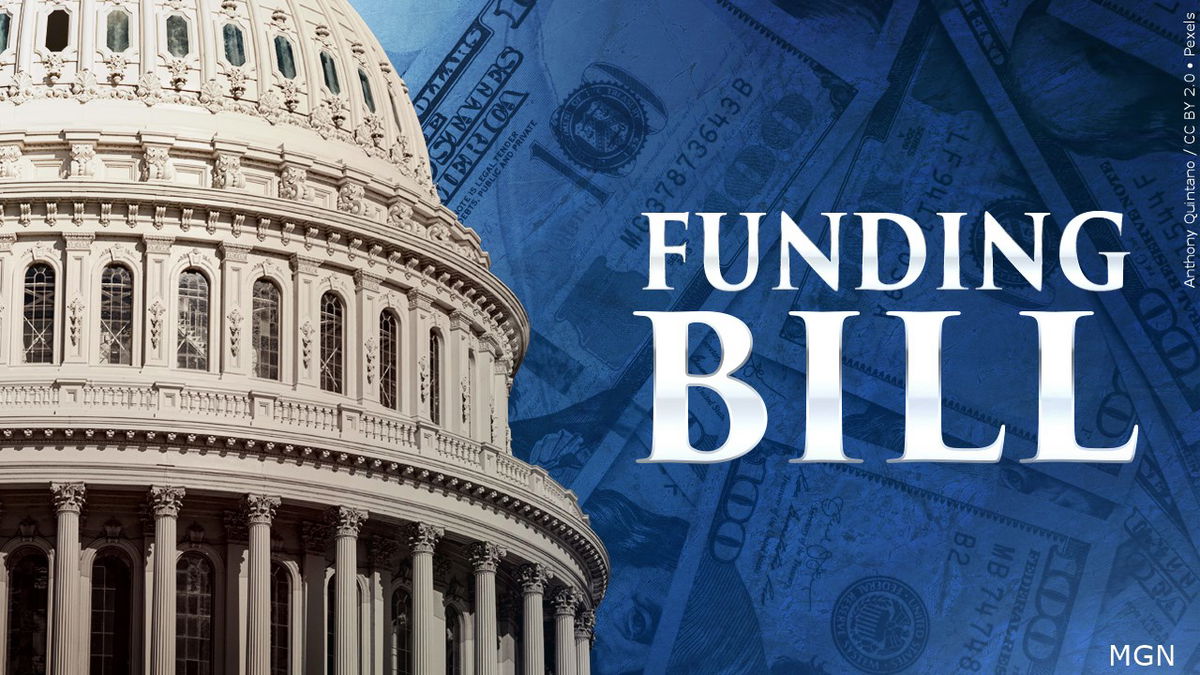Local projects funded in $1.7 trillion government funding package

Congress passed the $1.7 trillion government funding package on Friday, sending it to Biden's desk for his signature.
The bill passed with a 225-201 vote. Republican Congressman Ken Calvert voted against the bill, while Democratic Congressman Raul Ruiz voted for it.
Statement from Rep. Calvert:
“Americans understand that when Congress jams through an omnibus 4,000 page, $1.7 trillion bill just hours before Christmas there are going to be a lot of winners and losers – and on balance taxpayers are getting a raw deal. After President Biden and Speaker Pelosi have spent more than $3 trillion outside of our normal appropriations process over the past two years, it’s unconscionable to now ask taxpayers to pay for an 8% increase in non-defense programs. I voted against the bill because this reckless level of spending is unsustainable and inflationary.
Funding our government is one of the most basic and fundamental Constitutional responsibilities held by Congress. As a senior member of the House Appropriations Committee, I’m proud of the important work we completed earlier this summer. Unfortunately, our Senate counterparts failed to do their job. Americans are now seeing the disastrous results of a dysfunctional Senate thrusting us into a last-minute effort to catch up on essential legislation and negotiations that should have occurred months ago. Taxpayers deserve our best work, not a hurried attempt long after the assignment was due. The Republican House Majority must ensure Congress returns to a timely appropriations process next year.”
Statement from Rep. Ruiz
“This is good news for our local economy and communities. With the $21 million in federal funding that I secured, local families from Hemet to Coachella to Blythe will see critical projects move forward that will drive economic development and strengthen our infrastructure,” said Dr. Ruiz. “I look forward to President Biden quickly signing this legislation into law to deliver these bold investments to our region.”
Check out a list of projects authored by Rep Ruiz included in the package:
Projects authored by Rep. Ruiz included in the package:
- Imperial Irrigation District – Mecca and North Shore Energy Infrastructure Resiliency Project
- $2.4 million to reduce energy service interruption resulting from outages often caused by extreme weather events such as high winds and rainstorms.
- City of Hemet – Water Main Replacement
- $1.2 million to replace an aging transmission line from Park Hill’s tank site to the City’s distribution system.
- Coachella Valley Water District – Valley View Mobile Home Park Water Consolidation Project
- $3.45 million to install new water mains along Airport Blvd, Fillmore Street, Avenue 55, and Desert Cactus Drive to consolidate nine small water systems into Coachella Valley Water District potable water system.
- City of Indio – Interstate 10 and Monroe Street Interchange
- $1.5 million for the Interstate 10 (I-10) and Monroe Street Interchange Project to reconstruct and widen the Monroe Street interchange on the I-10 freeway.
- City of Desert Hot Springs – Bridges Over Water Project
- $2.5 million to construct two new bridges over low water crossings. These two bridges will be along Indian Canyon Drive.
- Desert Aids Project (Palm Springs, CA) – Campus Expansion
- $2 million request to help fund four components of their campus expansion project.
- Morongo Band of Mission Indians – Fire Station
- $1 million for the construction of a new fire station on the Morongo Indian Reservation.
- Riverside County of Education (Several Cities in CA-36) –Workforce Expansion, Equity, and Engagement Project
- $1.4 million request to increase and expand the early education workforce pipeline to address the shortage of child care providers in Riverside County. The Riverside County Early Education Workforce Project will use this funding to increase its workforce by adding 115 licensed child care providers to the early education workforce.
- Riverside Health System – Coachella Recovery Village
- $2 million to increase infrastructure capacity, including crisis, residential, outpatient services for mental health / primary care / Substance Use Disorder in homelike settings and housing the homeless population.
- SAC Health (Blythe, CA) – Bus Station
- $150,000 to build an all-weather bus bench/shelter and pave the parking lot in front of their new SAC Health Blythe location. This funding would allow individuals to safely access SAC Health through both public and private transportation.
- San Gorgonio Memorial Hospital (Banning, CA) – Equipment Purchase
- $452,000 request to purchase two pieces of equipment. The hospital provides the only Emergency Department in the Pass Area with the next closest facility being 35 minutes to an hour away depending on traffic
- Torres- Martinez Desert Tribe (Thermal, CA) – Workforce Development, Job-Training Program, and Apprenticeship Program
- The Torres-Martinez Desert Cahuilla Indian Tribe to assist in the completion of the Torres-Martinez Manufacturing and Fabrication Career Development and Job-Training Facility for the implementation of the Torres-Martinez Native American Workforce Development, Job-Training and Apprenticeship Program.
- Twenty-Nine Palms Band of Mission Indians – Dillon Road Corridor
- $2.7 million to reconstruct and widen a principal arterial roadway through Tribal lands in Riverside County.
- SunLine Transit (Thousand Palms) – Public Fueling Station
- $2.5 million to upgrade its 350-bar hydrogen public station to include a 700-bar fueling capability for light (personal vehicles) and heavy-duty (truck) vehicles effectively helping to transition the station to dispense hydrogen.
The portions of Dr. Ruiz’s legislation, the Salton Sea Projects Improvements Act, that are included in the omnibus are as follows:
- The Bureau of Reclamation may enter into grants, contracts, or cooperative agreements to carry out projects at the Salton Sea to improve air quality from lakebed dust, fish and wildlife habitat, recreational opportunities, and water quality.
- The Bureau of Reclamation may partner with the State of California, Tribal and local governments, water districts, the Salton Sea Authority, non-profit organizations, and institutions of higher education to implement these projects.




